|
|
|
Sort Order |
|
|
|
Items / Page
|
|
|
|
|
|
|
| Srl | Item |
| 1 |
ID:
100963
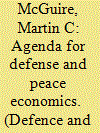

|
|
|
|
|
| Publication |
2010.
|
| Summary/Abstract |
This brief introduction celebrates the 20th Anniversary of the Journal, Defence and Peace Economics. Suggesting elements of an agenda for the future of this branch of economics, I raise several topics that are new and that seem to indicate that the field will expand and shift focus substantially in future years.
|
|
|
|
|
|
|
|
|
|
|
|
|
|
|
|
| 2 |
ID:
162573
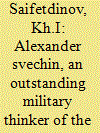

|
|
|
|
|
| Summary/Abstract |
The paper gives a concise biography and covers major stages in the life of the great military scholar, as well as the more important points from his basic works, which are still topical today.
|
|
|
|
|
|
|
|
|
|
|
|
|
|
|
|
| 3 |
ID:
175315
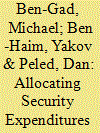

|
|
|
|
|
| Summary/Abstract |
We apply the information gap approach to resource allocation under Knightian (non-probabilistic) uncertainty in order to study how best to allocate public resources between competing defence measures. We demonstrate that when determining the level and composition of defence spending in an environment of extreme uncertainty vis-a-vis the likelihood of armed conflict and its outcomes, robust-satisficing-expected utility will usually be preferable to expected utility maximisation. Moreover, our analysis suggests that in environments with unreliable information about threats to national security and their consequences, a desire for robustness to model misspecification in the decision-making process will imply greater expenditure on certain types of defence measures at the expense of others. Our results also provide a positivist explanation of how governments seem to allocate security expenditures in practice.
|
|
|
|
|
|
|
|
|
|
|
|
|
|
|
|
| 4 |
ID:
027977
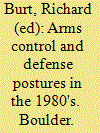

|
|
|
|
|
| Publication |
Boulder, Westview Press, 1982.
|
| Description |
x, 230p.
|
| Standard Number |
0865311625
|
|
|
|
|
|
|
|
|
|
|
|
Copies: C:1/I:0,R:0,Q:0
Circulation
| Accession# | Call# | Current Location | Status | Policy | Location |
| 020795 | 327.174/OSG 020795 | Main | On Shelf | General | |
|
|
|
|
| 5 |
ID:
088137
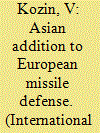

|
|
|
|
|
| Publication |
2009.
|
| Summary/Abstract |
THE GEORGE W. BUSH ADMINISTRATION, which has departed from the political arena, has left new President Barack Obama not only a host of unresolved regional problems, but also an array of issues concerning such a sensitive subject as arms control. The White House has effectively shelved such problem areas as further reduction of strategic offensive weapons (capabilities), tactical nuclear weapons, and control over five key types of conventional weapons in Europe, failing, together with its NATO partners, to ratify the well-known Treaty on Conventional Armed Forces in Europe (CFE).
Now Moscow and Washington will also have to deal with such a sensitive issue as the so called European missile shield - i.e., the deployment of U.S. strategic missile defense systems in Poland and the Czech Republic, planned by the previous Republican administration for deployment by 2011 - if established, they will account for around 25% of the U.S.'s entire strategic missile defense capability.
In this context, special attention also needs to be given to such a problem as the strategic and tactical missile defense system 1 that the United States has widely deployed and constantly upgrades in the Asia Pacific region - a system that has been left, as it were, outside the international debate due to the prominence given to Washington's plans to extend its "missile shield" to eastern Europe, closer to the Russian borders
|
|
|
|
|
|
|
|
|
|
|
|
|
|
|
|
| 6 |
ID:
005609


|
|
|
|
|
| Publication |
New York, Random House, 1995.
|
| Description |
x, 350p.Hbk
|
| Standard Number |
0679436170
|
|
|
|
|
|
|
|
|
|
|
|
Copies: C:1/I:0,R:0,Q:0
Circulation
| Accession# | Call# | Current Location | Status | Policy | Location |
| 036521 | 923.25694/PER 036521 | Main | On Shelf | General | |
|
|
|
|
| 7 |
ID:
183356
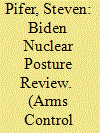

|
|
|
|
|
| Summary/Abstract |
President Joe Biden’s administration is conducting a missile defense review in parallel with its Nuclear Posture Review (NPR). Those reviews will determine whether to adjust the nuclear and missile defense programs that the administration inherited from its predecessor. They will also shape decisions on the contribution that negotiated arms control could make to meet the increasingly complex challenges of maintaining strategic stability and enhancing U.S. and allied security.
|
|
|
|
|
|
|
|
|
|
|
|
|
|
|
|
| 8 |
ID:
144741
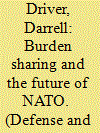

|
|
|
|
|
| Summary/Abstract |
The US role in the North Atlantic Treaty Organization (NATO) Alliance is a 65-year history of retrenchment and renewal. When Washington has sought a retrenchment from the world, it traditionally increased burden sharing pressure on Europe to do more. During times of increased global ambition, the USA reaffirmed its traditional leadership role in the Alliance and its commitment to NATO effectiveness and relevance. This cycle of NATO retrenchment and renewal, however, is halting. Though the USA will continue to go through periods of relative increases and decreases in security policy ambition, signs point to a permanent defense and security retrenchment in Europe. Germany is the ally singularly capable of filling the resulting security gap. If NATO is to avoid the drift toward irrelevance many critics have predicted, Germany will need to cast off old inhibitions toward security and defense leadership. These trends and their implications for NATO's future are explored through historical case studies and the shifting contemporary security environment.
|
|
|
|
|
|
|
|
|
|
|
|
|
|
|
|
| 9 |
ID:
131263
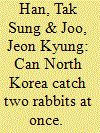

|
|
|
| 10 |
ID:
105079
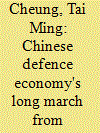

|
|
|
|
|
| Publication |
2011.
|
| Summary/Abstract |
China's defense economy has been vigorously developing a comprehensive set of innovation capabilities that will eventually allow it to join the world's top tier of military technological powers. China's target is to catch up by 2020. Although this maybe possible in a few select areas, the defense economy as a whole will likely require another decade or more to successfully master the ability to produce major innovations of a radical nature. This paper analyzes the key areas in the Chinese defense economy's gradual but accelerating shift from imitation to indigenous innovation.
|
|
|
|
|
|
|
|
|
|
|
|
|
|
|
|
| 11 |
ID:
125594
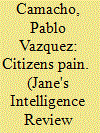

|
|
|
|
|
| Publication |
2013.
|
| Summary/Abstract |
Organised criminal gangs have gained such a foothold in some Mexican states that local self defence groups have sprung up to counter them. Pablo Vazques Camacho examines the groups origins, and how they may be causing a wider security issues.
|
|
|
|
|
|
|
|
|
|
|
|
|
|
|
|
| 12 |
ID:
145832
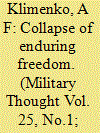

|
|
|
|
|
| Summary/Abstract |
The author discusses security on the landmass taken up by the member countries of the Shanghai Cooperation Organization (SCO) and closely scrutinizes Islamic fundamentalism dressing up in our times as the Islamic State (of Iraq and Levant, or Syria, to give the full unabbreviated name of ISIS), the Taliban, or whatever names its proponents choose to call it - that is raising its head in Afghanistan after the failure of Operation Enduring Freedom and withdrawal of the Western coalition's main forces from that country, and sheds light on the U.S.'s ill-fated role in the erosion of stability in the region. The author also argues for the need to strengthen the SCO's military arm to keep its enormous expanses secure and stable, and offers his recommendations on enhancing the Organization's power and capabilities to give its members a sense of protection and security.
|
|
|
|
|
|
|
|
|
|
|
|
|
|
|
|
| 13 |
ID:
129909
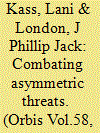

|
|
|
|
|
| Publication |
2014.
|
| Summary/Abstract |
The overarching objective of this analysis is to examine the ways and means by which the United States could take the asymmetric battle-space and win against the ever-changing array of threats posed by nation-states and non-state actors. Today's security challenges are predominantly hybrids: offense and defense; symmetric and asymmetric; synchronous and asynchronous; regular and irregular; geographically-focused and globally-ubiquitous. This reality requires multi-dimensional thinking, nuanced approaches, and nimble, decisive execution guided by a new strategic paradigm. Fighting on the enemy's terms, scoring short-term wins at unjustifiably high costs in lives, treasure and lost opportunities is simply unacceptable.
|
|
|
|
|
|
|
|
|
|
|
|
|
|
|
|
| 14 |
ID:
087003
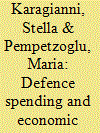

|
|
|
|
|
| Publication |
2009.
|
| Summary/Abstract |
This paper uses linear and non-linear Granger causality methods to determine the causal relationship between defense spending and economic growth in Turkey for the period 1949-2004. The innovative feature of this paper is that it provides evidence regarding the nonlinear causal dependence between military spending and economic growth in Turkey. The empirical results contribute to the empirical literature by indicating support for both linear and non-linear causality between military expenditures and economic development and they may prove useful in theoretical and empirical research by regulators and policy makers.
|
|
|
|
|
|
|
|
|
|
|
|
|
|
|
|
| 15 |
ID:
043423
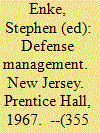

|
|
|
|
|
| Publication |
New Jersey, Prentice Hall, 1967.
|
| Description |
xiii, 385p.
|
|
|
|
|
|
|
|
|
|
|
|
Copies: C:1/I:0,R:0,Q:0
Circulation
| Accession# | Call# | Current Location | Status | Policy | Location |
| 003068 | 355/ENK 003068 | Main | On Shelf | General | |
|
|
|
|
| 16 |
ID:
145857
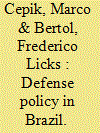

|
|
|
|
|
| Summary/Abstract |
This article aims to analyze the Brazilian Defense Policy in terms of its ability to reduce the gap between ends and means. Since 2003, the Brazilian defense policy has evolved along with Brazil’s increased role in the international system. Sustaining this process depends on institutional, economic, and operational conditions that are yet to be fully guaranteed. They require negotiations, reforms, and strategic perspective. By identifying specific challenges emerging from the national security institutional framework, the combat capability building process, the budgetary cycle, as well as from the defense industrial base, we sought to explain their rationale and to offer concrete policy pointers to overcome obstacles. As a general conclusion, the Brazilian defense policy was strengthened by the 2008 National Defense Strategy (END) due to its clearer strategic goals. Bridging the gap between those ends and the proper means is a continuous effort for any given country, but in the case of Brazil it has been addressed with firmer steps since the END, even in the face of harder economic and political conditions.
|
|
|
|
|
|
|
|
|
|
|
|
|
|
|
|
| 17 |
ID:
107668
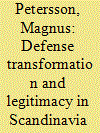

|
|
|
|
|
| Publication |
2011.
|
| Summary/Abstract |
This article analyzes how defense transformation in Scandinavia has been legitimized and which legitimacy it enjoys. The overall result is that it does not have unambiguous support. There are, however, similarities and differences, both between the North Atlantic Treaty Organization (NATO) members Denmark and Norway and nonaligned Sweden, and between the NATO members. Theoretically, the alliance members should be more willing to transform-even if it implies a "denationalization" of defense. In Denmark, that is, with some reservation, the case but not in Norway. Nonaligned Sweden should, according to the same logic, be resistant to downsizing the armed forces and gearing them for NATO expeditionary war fighting operations. However, that is not the case. A consequence of the negative attitude toward the transformation is less influence, resources, freedom of action, and so on, for the defense forces in general, and an even more lukewarm attitude toward conducting combat operations in a NATO context in particular.
|
|
|
|
|
|
|
|
|
|
|
|
|
|
|
|
| 18 |
ID:
087847


|
|
|
|
|
| Publication |
2009.
|
| Summary/Abstract |
The planned deployment of ballistic missile defense systems in Poland and a radar system in the Czech Republic to defend against possible attack from Iran has stirred strong opposition from Moscow. Concern about Iran's nuclear-enrichment program is legitimate, but the United States must address this issue by reconciling global objectives with regional tensions in the Middle East. If a negotiated solution is found, US policy must consider the reasons behind Iran's program, the dangers of proliferation of nuclear capabilities throughout the Middle East, and the strategic objectives the United States seeks with Russia, China, and Europe.
|
|
|
|
|
|
|
|
|
|
|
|
|
|
|
|
| 19 |
ID:
179488
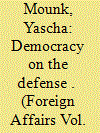

|
|
|
|
|
| Summary/Abstract |
After the Cold War ended, it looked like democracy was on the
march. But that con#dent optimism was misplaced. With the
bene#t ofhindsight, it is clear that it was naive to expect democracy to spread to all corners ofthe world. The authoritarian turn
ofrecent years re4ects the 4aws and failings ofdemocratic systems.
Most analyses ofthe precarious state ofcontemporary democracy
begin with a similar depiction. They are not altogether incorrect.
But they omit an important part ofthe picture. The story ofthe last
two decades is not just one ofdemocratic weakness; it is also one of
authoritarian strength.
|
|
|
|
|
|
|
|
|
|
|
|
|
|
|
|
| 20 |
ID:
041266
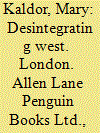

|
|
|
|
|
| Publication |
London, Allen Lane Penguin Books Ltd., 1978.
|
| Description |
219p
|
| Standard Number |
0713910763
|
|
|
|
|
|
|
|
|
|
|
|
Copies: C:1/I:0,R:0,Q:0
Circulation
| Accession# | Call# | Current Location | Status | Policy | Location |
| 018019 | 330/KAL 018019 | Main | On Shelf | General | |
|
|
|
|
|
|
|
|
|